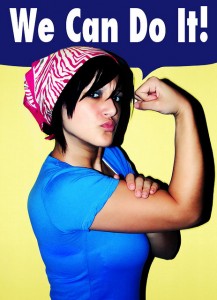Feminism Is For Latinas, Too
 I remember the exact moment I became a feminist. Imagine a chubby, 12 year-old Oh Hells Nah bored at church. I was daydreaming (probably about food, as I often did) when I suddenly heard this statement: “Women, you must obey your husbands.” I quickly sat upright, my ears perked. I looked around to see if anyone else was appalled — but no one but me seemed fazed by it.
I remember the exact moment I became a feminist. Imagine a chubby, 12 year-old Oh Hells Nah bored at church. I was daydreaming (probably about food, as I often did) when I suddenly heard this statement: “Women, you must obey your husbands.” I quickly sat upright, my ears perked. I looked around to see if anyone else was appalled — but no one but me seemed fazed by it.
After a long sermon about women’s subservience to their husbands, I said goodbye to the Catholic Church. Our relationship was already on the rocks, but that was the final push. It was also the day that I decided I was a feminist. I had already felt frustrated with the machismo I saw in my family and in my culture generally, but that moment made me particularly aware of gender inequality. It was a moment that ignited the rage that had been slowly simmering inside me.
Stereotypes of feminists abound. It’s a term that’s been dragged through the mire by the media and misinformed people. For many, the term conjures up images of man-hating mustachioed women burning their bras or whatever. But this is completely inaccurate. Feminism isn’t about superiority to men or man-hating. Nor is it about simply bridging the pay gap or climbing the corporate ladder. As Cheris Kramarae very succinctly said, “Feminism is the radical notion that women are human beings.”
To me, feminism is about basic human rights, the belief that all people should be entitled to a dignified life. It’s the awareness that women disproportionately experience certain injustices. It means believing that women should be protected against rape, violence, and abuse. It means acknowledging that our capitalist system is hostile towards women, particularly working mothers, and that globalization often causes horrible working conditions and serious human rights violations all over the world. It means understanding that sexism is inextricably linked with racism and classism. It means believing that women should have access to safe and legal abortions. Etcetera.
Since that day in church, I’ve tried my best to live my life as a feminist (making mistakes along the way, of course). I am grateful to my older brother who encouraged me by giving me feminist texts when I was in high school. Since then, I have consciously pursued a higher education not only because of my strong desire to learn, but to also because I wanted to be an independent woman who never had to rely on a man. I will never “obey my husband.” I will never let myself be subjugated or harassed. I’ve also dedicated most of my writing to bring attention to women’s issues.
And of course, men can be feminists, too. Many of the men in my life are, even if they don’t use that term. I firmly believe that everyone needs to be a feminist. I don’t see how anyone can disagree with something as simple and reasonable as a woman’s humanity.
A book I would recommend to everyone is Feminism is for Everybody by Bell Hooks. It’s like feminism for dumb-dumbs, in that it breaks it down in a reader-friendly way. It’s a fast read and gives concrete examples of how to make the world a better place. I found it to be refreshing and informative. One of her suggestions is to simply read a feminist text. Many people who spout negative comments about feminists have never read any of the literature. How can you disagree with something you don’t even understand?
Women of color experience sexism and misogyny differently. We are dehumanized on several levels. Please don’t hesitate to use the “F” word if you fight these realities. Feminism isn’t an ideology limited to privileged white women.
[Photo By Morning theft]
